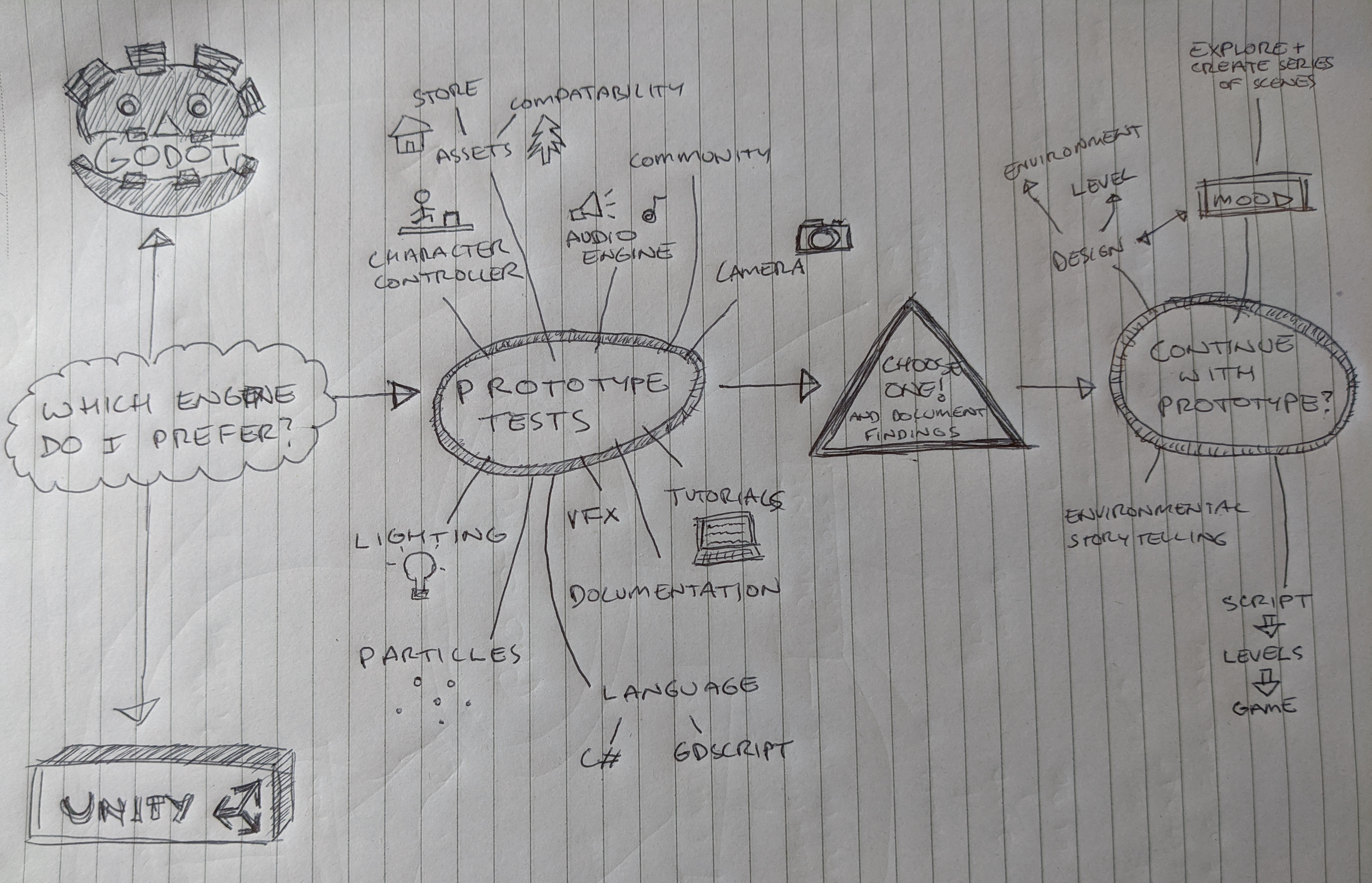
RATIONALE: INTENTION
I am intending to begin work on a prototype for a small 3D adventure game I have previously conceived and scripted in Animated Narratives for my folio 1, emphasizing an exploration of how to craft moods and emotional arcs (without dialogue) within the game. For my studio project, I would like to first build on my existing programming knowledge and explore the 3D-capable engines Unity and Godot, comparing their capabilities and ease of use in line with my own preferences, and eventually selecting one to further develop my prototype.
CONTEXT: FIELD
After the more technical documentation in the initial stages of my studio as I compare the engines, my work will sit within the field of game development and interactive storytelling. There have been several successful and influential games that place an emphasis on elements I would like to incorporate into my own game: enjoyable and aesthetically pleasing movement mechanics, environmental storytelling, and powerful emotional arcs (sometimes despite having no dialogue at all), including Gris, Journey, What Remains of Edith Finch, and Limbo. Large game development companies such as Bioware also take great care during production to consider the player's emotional state during the game, and have documented and tracked moods as an important design consideration during production and play-testing.
Since the story of my game explores the effects of climate change, my work may also edge into fields of politics, science and social commentary. Interestingly, there are very few games that have explored climate change as a key theme, especially not AAA titles - though often the precursor for conflict (dwindling resources leading to war, or a hasty retreat from Earth in search of a new home) such as in Dead Space, Mass Effect Andromeda, and Monster Hunter, the issue is usually dropped after the initial backstory has been set up, and the games instead dedicate their time to exploring conflict, war, zombies, and/or individual characters. Other games (perhaps unintentionally) do explore themes of resource management, and playing them to their conclusion often results in total environmental devastation and the depletion of finite resources. These include the resource management and sim games Factorio, Warcraft, and Starcraft, among others. However, there are some games (often from independent developers) that have explored climate change or its effects more explicitly: Beyond Blue, Submerged, Eco, and (not yet released) Endling.
METHOD: CONCEPTUAL, TECHNICAL, CRAFT AND MANAGEMENT
Through my experimentations with Godot and Unity, I am hoping to expand my skills as a programmer and also game designer in 3D space, as well as gain an awareness of some of the major game engines. I will be creating small prototypes in both engines and comparing how successful I am in executing the design goal, as well as each engine's ease of use and accessibility. This will allow me to not only experiment with game design in a 3D engine (where I had previously only designed games in 2D spaces), but eventually choose one engine to continue making my prototype with, and potentially publish my documentation and experience with each engine online for other game developers to consider.
My studio work will also allow me to test the effectiveness of different designs on the game feel, such as how different aspects of the prototype change the mood of the game (lighting, colours, player speed, animation, mechanics, camera perspective, environment, and level design).
PRODUCTION: TOOLS
I will be using Godot and Unity as my game engines, and utilising the documentation from each engine and available tutorials. I will create a series of small prototypes in each engine that may include any of the following: small scenes from my story, setting up lighting, VFX, particle systems, game mechanics such as movement (jumping, gliding), and physics simulations involving wind (an important force and mechanic in my game). I will document my experience in each engine and eventually choose and justify one, which I will use to continue building my prototype. My later work in one of these engines will be more explicit explorations of themes and mechanics from my story, concentrating on attempts to effectively set up scenes and levels that evoke specific moods.
About This Work
By Natasha Vranic-Peters
Email Natasha Vranic-Peters
Published On: 13/03/2020
